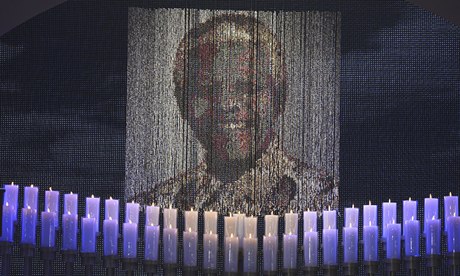The improbable journey from prisoner to president officially came to an end on Sunday, when Mandela was laid to rest in his childhood village of Qunu. I had never really looked into his life (besides seeing the movie "Invictus") before. And with a little bit of research I found clear similarities to problems that we continue to face on this side of the pond.
President Obama made a speech at Soweto soccer stadium in South Africa where he he received a thunderous applause. He hailed Mandela's countless acts of reconciliations, noting that he was jailed for 27 years by the apartheid regime, but alas he still embraced his Afrikaner (white minority) enemies when he was released. Obama said "It took a man like Madiba (Mandela's clan name) to free not just the prisoner, but the jailer as well." This quote is very powerful in many ways, and it's something that, though overlooked, is still a problem today right here in these United States.
Mandela's death came right at the end of a unit in my American Studies class about the Prison-Industral Complex, which refers to the rapid expansion of the prison system and increase in inmate population in the United States since 1970. Law enforcement is cracking down on imprisonment for non-violent crimes, especially on those in the ethnic minorities. Mandela was in the middle of his prison term at Robben Island when this began. His life sentence was handed over due to a "civil disobedience" charge. In the United States we are seeing the enforcement of a "three strikes and you're out" system for nonviolent crimes. Where you are put away for life for things that, a few decades ago, weren't even considered a felony.
Although the United States is probably considered more "first world" than South Africa, the Number of black males in prison per 100,000 during the Apartheid era was 851. In comparison for the United States, the number is 4,848. So my question is, who will be our Madiba? When, in fact, the domestic problem is worse.

